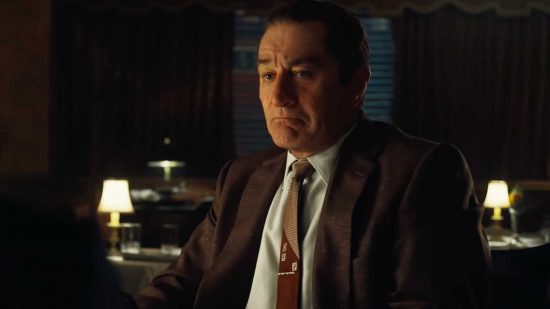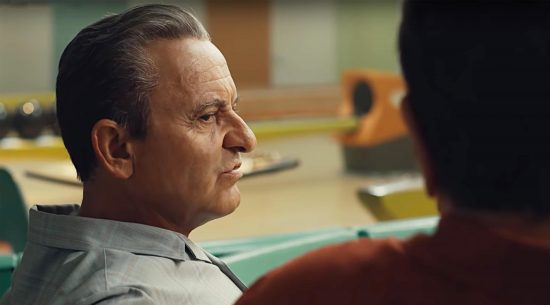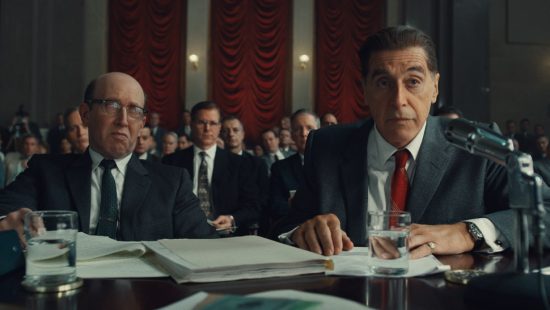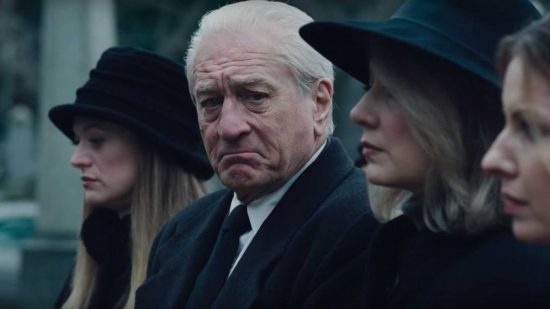LFF 2019 Review: The Irishman – “A sprawling, majestic masterpiece”
There is a quiet, glacial atmosphere which haunts each frame of Martin Scorsese’s biblical mob epic, The Irishman. Unlike the firecracker crime dramas which defined his great career, this is a more contemplative and meditative portrait; a gangster movie with ice in its veins, yet remorse in its heart. That air of chilliness is the presence of that single thing nobody – no matter how much money or influence – can escape: time.
You will have heard about the film’s length, ironically at great length, but duration really is irrelevant when the scale, skill and craft is this unprecedented. With a narrative spanning some sixty years, Scorsese conducts an exhilarating, unforgettable account of betrayal, violence, masculinity, politics, and emotional neglect. At the tender age of 76, he has made his great American novel. He has created a sprawling, majestic masterpiece.
Robert De Niro turns in arguably his greatest performance of the decade as Frank Sheeran; the eponymous Irishman who narrates and navigates us through the compelling and uncompromising mafia underbelly. We meet Sheeran old and frail, rotting away in a retirement home, as he recollects an archive of experiences – some good, many questionable – which have shaped his very existence.
From the first shot to the final, Scorsese establishes with deft nuance how time waits for no man. There are plentiful people in The Irishman whose time is up long before it’s really due (throughout, title cards appear telling the viewer the increasingly ludicrous ways said players have met their maker), and equally many who last a lot longer than their behaviour would suggest. But in the end, if the mob, the debt collectors, or the law fail to catch up with you, time certainly will.
Sheeran was a WWII veteran stationed in Italy and consequently can speak fluent Italian (important). After the war, he takes up a humble, blue-collar job as a truck driver; delivering the finest steaks in the United States. However, it isn’t long before a powerful mobster takes a shine, after a chance meeting at a gas station. He’ll soon be revealed as Russell Bufalino (Joe Pesci); a gentle, grandfatherly figure of towering influence. Scorsese famously – and finally – pulled Pesci out of retirement for the role, after reportedly fifty failed attempts. It was, for my money, one of the best creative decisions the filmmaker has ever made.
Pesci is, quite simply, phenomenal; the best performance of his career bar none. He is the silent, softly-spoken star of the film. You’ll find no trace of his now trademark explosiveness here – zero volcanic eruptions or lashings of brutal violence. Instead, you’ll uncover a delicately rendered father figure; a guiding hand, a haver-of-words. And yet somehow Pesci still manages to make “Russ” deeply menacing. There is a great terror in his thoughtfulness and patience – as if you can see the cogs quietly turning; just waiting for one to fail. A glance, an expressive brow, a trailing of a sentence. It’s unequivocally among the great supporting (if you can call it that) performances of 2019, and arguably the 2010s.
Bufalino introduces Sheeran to a whole new world – one of quick-fire executions, dirty money, and hard-earned respect. After some small-time gigs, Frank is given his biggest assignment to date: becoming the right-hand man to beloved Teamsters Union President, Jimmy Hoffa (Al Pacino). Enigmatic and outspoken, he is a voice for the people – the real people – not those toffs in Washington who’ve enjoyed life from a silver spoon. Sheeran too finds great comfort and family in Hoffa’s presence; an inseparable double act, deepened further by Hoffa’s ability to connect with Frank’s estranged daughter, Peggy (Anna Paquin).
Hoffa’s position is, well, almost entirely funded by the mob. He loans the wise guys cash from the Union’s ballooning pension fund, and in return, they preserve and protect his closest council – think bodyguards; albeit ones who’ll drop you with a .45 in a heartbeat. Incredibly, The Irishman serves as the very first pairing between Scorsese and Pacino, but you wouldn’t think it. Another excellent creative choice, Scorsese and screenwriter Steve Zaillian never try to pin Hoffa down too much – I mean, what’s the point? You have Al Pacino at your disposal. Just let him rip. And boy does he. The most inflated, bile-spitting performance of the trio, Pacino simply runs riot; he bellows, he barks, he squabbles, and he scraps. It’s endless fun watching Hoffa – deep down a motivated and passionate advocate for America’s grafters – whip and fizz like a Catherine wheel. Ongoing pow-wows with New Jersey crime boss, Tony Pro (a feisty, fantastic Stephen Graham) are moments to forever cherish. A heated spat regarding lateness and suitable meeting attire is nothing short of iconic.
Now Pacino is not just a one-trick pony, and does have grounded moments too, largely shared with Sheeran, and they are equally impressive. But the film’s mature approach to character development needs a measure of a little something-something to balance the cocktail. When you have three titans of gangster cinema in the same film – under the guidance of the auteur who fundamentally revolutionised the genre’s foundations – there is always the risk that the limelight simply isn’t bright enough. Thankfully, this is never the case here. From the offset, Scorsese and Zaillian’s immaculate control puts you at ease, and the cast hit the message home with an almighty blow.
The Irishman is adapted from Charles Brandt’s 2004 memoir, “I Heard You Paint Houses” (which is essentially mob code for carrying out hits); ie: redecorating a person’s home by painting it with blood. What Zaillian has managed to do so effortlessly is lift a lifetime of heavy information – potentially expositional and sluggish in less efficient hands – and transform it into a symphony for the screen. Despite the film clocking in at a gargantuan 209 minutes (essentially three hours, thirty minutes), never does a single frame, line or action feel unnecessary. Every incremental element is thoughtful, relevant, and above all else, immersive. Sure, it’s a long movie, but never does it feel long, and that’s telling of how accomplished the narrative transition is.
As with any Scorsese film, audiences will have an expectation of its visual composition. Despite this being a Netflix production, not a penny has been scrimped or squandered, because in short, it looks absolutely magnificent. The many eras we span with Frank are all beautifully, decadently realised; you can smell the leather and cigar smoke in the restaurants, you can feel the rain drip down your neck as we navigate the night-soaked mean streets. The world of the film lives and breathes; as important a character as those operating within its city veins.
As many will know, the film arrives on Netflix late November. One fears the temptation for viewers to pause and resume, as opposed to digesting every last delicious piece in one go, will be extremely high. The best advice this author can give is this: watch The Irishman the way the creators intended – in one sitting. Yes, it is lengthy, but set aside the time – you will be infinitely rewarded.
There are very few filmmakers who could ever match or best the magnitude of what Scorsese has achieved here. He has created a work of cinematic art for the ages. A towering feat of craftsmanship and care. It is the product of a master operating at the very peak of his prowess. And like the film, which perfectly hums with a quiet sense of closure, The Irishman feels like coming home; a tip of the hat to a remarkable, unrivalled career.
The Irishman screened as the 2019 BFI London Film Festival Closing Night Gala. It arrives in select theatres on 1st November and worldwide via Netflix on 27th November.
















